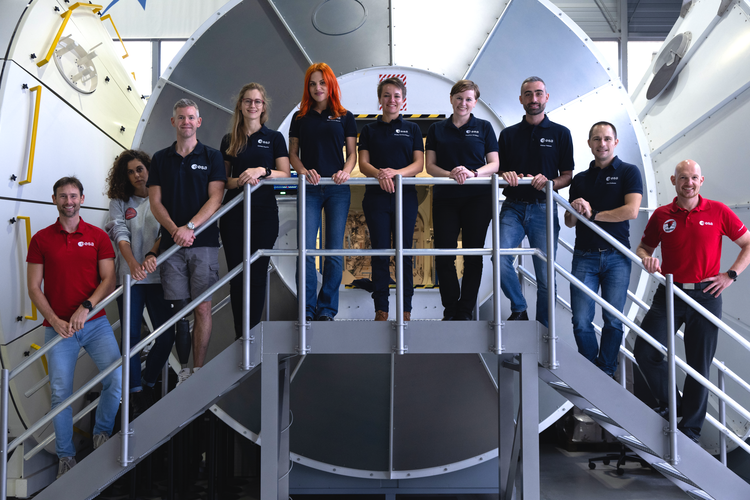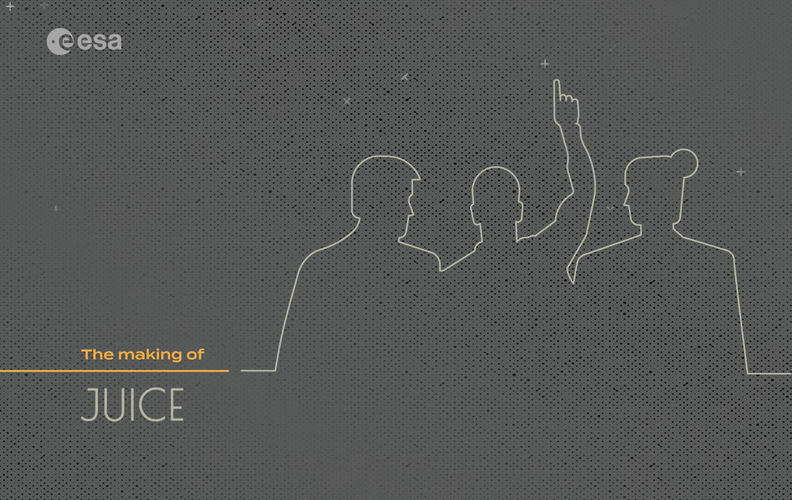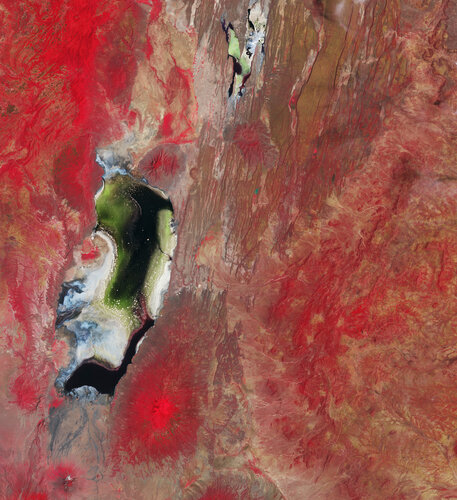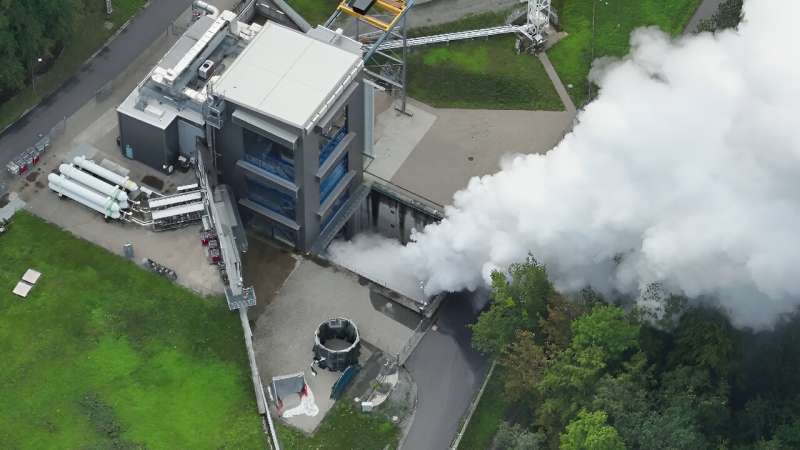
Copernical Team
Week in images: 20-24 November 2023

Week in images: 20-24 November 2023
Discover our week through the lens
‘The making of Juice’: the story behind the film

One giant planet. Three icy moons. An eight-year journey. One special spacecraft.
Building a mission to Jupiter took years of planning and thousands of people. Now that Juice is finally en route to its destination, our documentary ‘The making of Juice’ takes a look behind the scenes at the development and testing of the spacecraft in the three years leading up to launch. We hear from Juice Project Manager, Giuseppe Sarri, about how and why the film was made.
HummingSat: a new chapter in space innovation unveiled

ESA and SWISSto12, a leading manufacturer of advanced satellite payloads and systems, have signed a contract for the full development of a new product line of satellites called HummingSat.
Earth from Space: Salty lakes
 Image:
The Copernicus Sentinel-2 mission captures the colourful waters of two salty lakes in East Africa: Lake Natron in northern Tanzania and Lake Magadi in southern Kenya.
Image:
The Copernicus Sentinel-2 mission captures the colourful waters of two salty lakes in East Africa: Lake Natron in northern Tanzania and Lake Magadi in southern Kenya. Europe's Ariane 6 rocket successfully completes hot-fire test

The European Space Agency's Ariane 6 rocket successfully completed a dress rehearsal on Thursday, test-firing its engine in preparation for a maiden voyage scheduled for 2024.
The final results of the ignition test, which involved firing up the Vulcain 2.1 engine and running it for more than seven minutes, will not be released until November 30, pending a full analysis.
But manufacturer ArianeGroup already called the rehearsal "successfully completed".
The hot-fire test at Europe's Spaceport in French Guiana "simulated a complete launch sequence and thus validated the entire flight phase of Ariane 6's core stage," it said in a statement after Thursday's rehearsal.
ArianeGroup CEO Martin Sion praised the team for the "real industrial feat", but added that "a few additional tests", notably fault tolerance, were still needed before the rocket was ready for launch.
Ariane 6 Core Stage fires up for long-duration test
 In a significant step towards the maiden flight of Ariane 6, the collaborative efforts of ArianeGroup, the French Space Agency (CNES), and the European Space Agency (ESA) culminated in the successful execution of a long-duration hot-fire test of the Ariane 6 core stage. This test, conducted on November 23, 2023, at Europe's Spaceport in French Guiana, marks a pivotal advancement in the launch ve
In a significant step towards the maiden flight of Ariane 6, the collaborative efforts of ArianeGroup, the French Space Agency (CNES), and the European Space Agency (ESA) culminated in the successful execution of a long-duration hot-fire test of the Ariane 6 core stage. This test, conducted on November 23, 2023, at Europe's Spaceport in French Guiana, marks a pivotal advancement in the launch ve X-59 gets a Patriotic makeover
 NASA's X-59 quiet supersonic aircraft, a groundbreaking project aiming to revolutionize supersonic travel, recently marked a significant milestone in its development. The aircraft has been moved to the paint barn at Lockheed Martin Skunk Works' facility in Palmdale, California, indicating progress towards its completion.
The X-59's new paint scheme is not just a cosmetic upgrade but also p
NASA's X-59 quiet supersonic aircraft, a groundbreaking project aiming to revolutionize supersonic travel, recently marked a significant milestone in its development. The aircraft has been moved to the paint barn at Lockheed Martin Skunk Works' facility in Palmdale, California, indicating progress towards its completion.
The X-59's new paint scheme is not just a cosmetic upgrade but also p India opens skies to Eutelsat OneWeb for satellite broadband services
 In a significant development for India's satellite broadband landscape, OneWeb India, part of the Eutelsat Group (Euronext Paris: ETL), has received the green light from IN-SPACe (Indian National Space Promotion and Authorisation Centre) to launch Eutelsat OneWeb's commercial satellite broadband services in the country. This landmark approval positions OneWeb India as the first organization to a
In a significant development for India's satellite broadband landscape, OneWeb India, part of the Eutelsat Group (Euronext Paris: ETL), has received the green light from IN-SPACe (Indian National Space Promotion and Authorisation Centre) to launch Eutelsat OneWeb's commercial satellite broadband services in the country. This landmark approval positions OneWeb India as the first organization to a Shanghai Sets Sights on Expanding Space Industry with Ambitious 2025 Goals
 Shanghai, a growing center for technological advancement, has unveiled a bold plan to develop a comprehensive industrial chain for commercial rocket production, aiming to reach an annual production capacity of 50 commercial rockets and 600 commercial satellites by 2025.
Outlined in an official plan released on Monday, this initiative underscores Shanghai's commitment to reinforcing its pos
Shanghai, a growing center for technological advancement, has unveiled a bold plan to develop a comprehensive industrial chain for commercial rocket production, aiming to reach an annual production capacity of 50 commercial rockets and 600 commercial satellites by 2025.
Outlined in an official plan released on Monday, this initiative underscores Shanghai's commitment to reinforcing its pos NASA's future space exploration bolstered by major plutonium-238 delivery
 The U.S. Department of Energy's (DOE) recent achievement in shipping a substantial amount of heat source plutonium-238 to the Los Alamos National Laboratory signifies a pivotal advancement for NASA's future space missions. This latest shipment, consisting of 0.5 kilograms (a little over 1 pound) of new heat source plutonium oxide, is noteworthy as the largest since the domestic restart of pluton
The U.S. Department of Energy's (DOE) recent achievement in shipping a substantial amount of heat source plutonium-238 to the Los Alamos National Laboratory signifies a pivotal advancement for NASA's future space missions. This latest shipment, consisting of 0.5 kilograms (a little over 1 pound) of new heat source plutonium oxide, is noteworthy as the largest since the domestic restart of pluton 